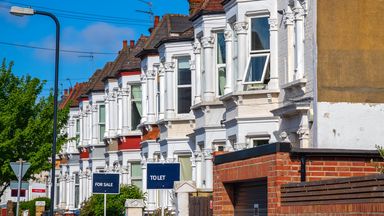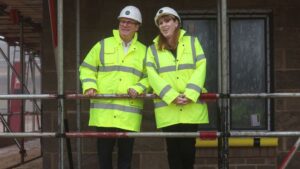What could the government be planning on council tax?
The government is rumoured to be looking at making major changes to council tax for the first time since its introduction in 1993.

The prime minister has warned of a “painful” autumn budget, telling the public it will have to “accept short-term pain for long-term good”.
Labour has given assurances it will not increase national insurance, income tax or VAT, but refused during their election campaign to say if other taxes would be raised.
It has led to speculation that council tax could be one of the areas Labour looks to raise extra funds.
But how does council tax work now, what could the government change?
Current council tax system
Council tax is paid on domestic properties and collected by local councils.
Some people don’t have to pay it or get discounts, but most people over 18 who aren’t students living with other students are charged.
There are valuation bands for applicable properties which dictate how much tax needs to be paid.
These are the UK’s current bands and rates, which are based on the value of properties as they were in 1991:
A – up to £40,000
B – £40,001 to £52,000
C – £52,001 to £68,000
D – £68,001 to £88,000
E – £88,001 to £120,000
F – £120,001 to £160,000
G – £160,001 to £320,000
H – more than £320,000
Wales has its own bands and rates, which it updated in 2003. They are:
A – up to £44,000
B – £44,001 to £65,000
C – £65,001 to £91,000
D – £91,001 to £123,000
E – £123,001 to £162,000
F – £162,001 to £223,000
G – £223,001 to £324,000
H – £324,001 to £424,000
I – more than £424,000
Different local councils charge different rates for each of the bands, with rates in central London often some of the cheapest due to the high population density, and those in more rural areas usually higher due to the expense of providing roads and services across larger and less densely populated areas.
Current laws stipulate that any local authority wanting to raise council tax by 5% or more has to hold a referendum first.
Use of current system ‘absurd’
The current council tax system was introduced in 1993 and followed rioting over Margaret Thatcher’s planned poll tax reforms to the old rating system in 1990.
The rating system was based on an estimated rental value of a property and was reviewed every few years. Meanwhile, Ms Thatcher’s reforms would have seen everyone in each local authority area pay the same rate per head, regardless of the value of their property.
She had hoped to move the tax away from properties to people – but her reforms proved controversial because larger families living in smaller homes would have paid higher rates than smaller families living in larger, more spacious properties.
Under the current system, rates are based on house prices from 1991, meaning the council tax households pay is based on the value of their property relative to others in England in 1991.
New build properties developed after that date are estimated by the Valuations Office Agency (VOA) and banded accordingly.
However, property values have changed significantly in the last three decades, with some London house prices having risen by more than 800% in that time, whereas in places like Hartlepool, in County Durham, they have barely tripled, according to the Land Registry.
Read more:
Which other tax changes could the government introduce?
Analysis: Starmer will need to show progress amid bleak picture
The Institute for Fiscal Studies (IFS) has labelled use of the current system as “absurd” while the Institute for Government (IfG) has called it “incredibly poorly designed”.
David Phillips, an associate director at the IFS, summarised the perceived problems earlier this year, saying: “Since this one and only valuation of houses [in 1991], values have increased by massively different amounts around the country, meaning that at least half are now effectively in the ‘wrong band’.
“Households in the North and Midlands are often in too high a band – and pay too much – while those in London and its environs too low a band – and pay too little – compared to what they would under a modernised tax.”
What has Labour said about it in the past?
Labour politicians, including the chancellor Rachel Reeves, have previously called for a council tax revaluation.
A leaked recording from March revealed now chief secretary to the Treasury, Darren Jones, saying he was frustrated by the “out of date” council tax system and hinted those with homes worth over £1m may have to pay more.
In Wales, the Labour Party has promised to introduce new council tax bands and tax band rates, but that has been pushed back to 2028.
Sir Keir Starmer previously described the Welsh Labour government as a “blueprint for what Labour can do across the UK,” and has spoken about his desire to reform local authority funding.
Asked by Sky News earlier this year whether he would rule out a council tax review in England, Sir Keir said council tax was “too high for too many people”, and he was “not wanting to raise tax”.
Health secretary Wes Streeting did not rule out a potential council tax rise when asked about it by Sky News in June, but said: “We don’t want to see people clobbered on council tax.”
A YouGov poll carried out earlier this month suggested an increase in council tax would be incredibly unpopular with the public, with just 9% of people who responded to the survey backing such a raise.
What could the government change?
While Labour said before the election it would not change the banding of council tax, there may be other updates on the table.
There have been unconfirmed reports that the government could replace the banding system entirely in favour of a 0.5% tax on the value of a property per year.
This would mean that someone in a property worth £350,000, for example, would pay £1,750 a year.

Keep up with all the latest news from the UK and around the world by following Sky News
Gemma Tetlow, chief economist at the IfG, said council tax could be reformed “in a very sensible way… rather than having the banded system you could move to something that is much more proportional tax on land revenue”.
She added: “You could do that sensible structural reform and raise some extra money at the same time.”
However, the move could particularly impact those living in London, where the average one-bedroom flat peaked at £327,000 in 2020.
Why might council tax (and other taxes) be raised?
Ms Reeves has accused the previous Conservative government of “covering up” the true state of the nation’s finances, leaving a £22bn spending hole in their wake which Labour now needs to mitigate.
Her predecessor Jeremy Hunt has denied that is the case and accused Ms Reeves of using the £22bn “black hole” as a smokescreen to justify tax hikes and spending cuts she was always planning.
But regardless of who is to blame, any tax hikes or spending cuts come 30 October will essentially be to make up for the fact that the government is making less than expected and spending more than expected, explains Sky News economics and data editor Ed Conway.
He says even though economic news hasn’t looked dire on paper since Labour took over – with inflation remaining low and Britain’s economy growing fast – the latest public finances numbers paint a more sombre picture.
First, despite the fact that the economy is growing faster than expected, it’s not resulting in a big windfall of tax revenues.
“The Office for Budget Responsibility (OBR) forecast back in March that by now the government would have collected around £327bn in tax revenues,” Conway explains. “Instead it has collected only £326bn – a little bit less. So no big windfall.
Be the first to get Breaking News
Install the Sky News app for free


“But now look at the amount it’s spending, and the story is slightly more stark. The OBR thought the government would have spent around £396bn by this point in the year. Instead, it’s already spent £405bn.
“And that overspend might not sound much, at £9bn.
“But consider that £9bn happens to be precisely the amount of ‘headroom’ the government has before it breaks its fiscal rules and you see the issue.
“And this, bear in mind, is only the data for the first four months of the fiscal year. If these trends continue, the gap could get bigger still.”
He concludes the latest public finance numbers provide “a clear rationale for the course of action the chancellor has (according to those I talk to in Whitehall) already decided upon: more taxes and more spending cuts in this October’s budget.”


